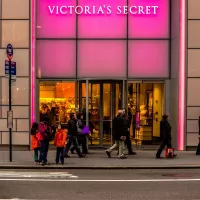J.Crew Group, Inc. is a multi-brand retailer in the United States that operates through multiple channels. They provide a wide range of apparel and accessories for men, women, and children. Their offerings include clothing items like swimwear, outerwear, loungewear, sweaters, denim, dresses, and suits, as well as accessories like bags, jewelry, and shoes.
1947: Founding of Popular Merchandise, Inc.
Mitchell Cinader and Saul Charles established Popular Merchandise, Inc. in 1947, initially operating as Popular Club Plan. The company specialized in selling affordable women's clothing through in-home demonstrations.
January 1983: First Popular Club Plan Catalog
J.Crew mailed its inaugural Popular Club Plan catalog to customers in January 1983, marking its foray into catalog retail.
1983: Renaming to J.Crew, Inc.
Popular Merchandise, Inc. underwent a name change in 1983, becoming J.Crew, Inc. The company also explored selling the Popular Club Plan brand, but the attempt was unsuccessful.
1985: Launch of Clifford & Wills Brand
In 1985, J.Crew introduced a new brand named "Clifford & Wills." Positioned as a more affordable option compared to their existing Popular Merchandise line, Clifford & Wills focused on providing women's clothing.
1987: Departure of Executives and Founding of Tweeds
Two executives departed from J.Crew in 1987 to establish their own catalog-based company, Tweeds.
March 1989: J.Crew Opens First Retail Outlet and Expands Catalog Lines
In March 1989, J.Crew opened its first retail store in Manhattan's South Street Seaport. They also introduced two new catalog lines: "Classics" for work and leisure wear, and "Collections" featuring dressier and pricier items.
1989: End of Popular Club Plan Catalog Name
J.Crew ceased using the "Popular Club Plan" name for its catalog in 1989.
1989: First J.Crew Retail Store Opens
J.Crew celebrated a significant milestone in 1989 with the opening of its first retail store in the South Street Seaport area of downtown Manhattan.
1990: J.Crew Reaches $400 Million in Revenue but Faces Store Profitability Challenges
J.Crew's revenues reached $400 million in 1990. However, the company acknowledged that their existing four stores were not yet generating enough profits to cover their overhead expenses.
April 1991: J.Crew Expands Marketing Efforts into Canada
In April 1991, J.Crew mailed out catalogs to potential customers in Ontario, Canada, as part of their effort to expand into the Canadian market.
1992: J.Crew Intensifies International Expansion Efforts
In 1992, J.Crew hired a new vice-president for international development to further their expansion into international markets, building on their existing catalog distribution in Japan and Europe.
October 1997: Texas Pacific Group Acquires Majority Stake
Investment firm Texas Pacific Group Inc. acquired a controlling stake in J.Crew Group in October 1997, marking a shift in ownership for the company.
2000: Texas Pacific Group Increases Stake and Clifford & Wills Sold
Texas Pacific Group's ownership in J.Crew increased to around 62% in 2000. To bolster sales, J.Crew decided to sell the Clifford & Wills brand to Spiegel.
2004: Acquisition of Madewell Brand Rights
J.Crew acquired the rights to the Madewell brand in 2004, a defunct workwear manufacturer originally founded in 1937.
2006: Relaunch of Madewell Brand
J.Crew relaunched the Madewell brand in 2006, aiming to target a younger female demographic compared to their main brand. They positioned the relaunched brand as a "modern-day interpretation" of the original Madewell.
2006: J.Crew Goes Public
J.Crew went public in 2006 with an initial public offering (IPO), raising $376 million by selling new shares equivalent to 33% of its expanded capital.
November 23, 2010: Agreement to Go Private
J.Crew agreed to a $3 billion deal on November 23, 2010, to be taken private. The deal was led by management with backing from TPG Capital and Leonard Green & Partners.
2011: J.Crew Faces Controversy over Advertisement Featuring Gender Nonconformity
In 2011, J.Crew faced criticism from conservative media for an advertisement showing Jenna Lyons, the creative director, painting her son's toenails pink, sparking debate about gender norms.
2011: J.Crew Announces Expansion Plans for the UK
J.Crew CEO Mickey Drexler revealed plans to expand into the UK in 2011, with a flagship store planned for London's Regent Street, following their expansion into Canada.
2011: J.Crew Opens First International Store in Toronto
J.Crew opened its first international store in 2011 at the Yorkdale Shopping Centre in Toronto, Canada.
2011: J.Crew Goes Private Again
TPG Capital LP and Leonard Green & Partners LP took J.Crew private again in 2011 through a leveraged buyout valued at $3 billion.
2012: J.Crew Announces Expansion in Canada with New Stores and Factory Outlets
In 2012, J.Crew announced four new store locations in Canada, including Edmonton, Vancouver, and two in Toronto. They also planned to open two factory stores in Vaughan Mills and Edmonton.
2013: J.Crew Opens at Markville Shopping Centre
Continuing its expansion in the Greater Toronto Area, J.Crew opened a store at Markville Shopping Centre in 2013.
May 2014: J.Crew Opens Stores in Hong Kong
In May 2014, J.Crew opened two stores in Hong Kong, a women's store at the International Finance Centre and a men's shop on On Lan Street, marking their entry into the Asian market.
2014: J.Crew Unveils Flagship Location in Yorkville, Toronto
In early 2014, J.Crew opened its flagship store in the Yorkville neighborhood of Toronto.
June 2015: J.Crew Women's Division Slumps
The New York Times reported in June 2015 that J.Crew's women's division experienced a downturn due to the company's inadequate response to emerging market trends, namely the rise of affordable "fast fashion" and the growing popularity of "athleisure" apparel.
December 2016: J.Crew Faces Litigation
J.Crew found itself facing legal action in December 2016 after making the decision to move its intellectual property to shield it from lenders.
2016: J.Crew Group Begins Closing Retail Locations
J.Crew Group started closing J.Crew and J.Crew Factory stores, a process that would continue into 2018.
April 2017: Job Cuts and Management Changes at J.Crew
J.Crew initiated a round of job cuts in April 2017, laying off 250 employees, primarily from its headquarters. This period also saw significant management changes, including the departure of long-term creative director Jenna Lyons and head of menswear, Frank Muytjens.
June 12, 2017: J.Crew Proposes Debt Restructuring to Bondholders
On June 12, 2017, J.Crew Group Inc. extended an offer to a portion of its bondholders, aiming to restructure its debt obligations. The company proposed pushing back its most immediate debt payment of approximately $567 million, originally due in May 2019, and sought amendments to its term loan.
June 2017: CEO Mickey Drexler Steps Down
In June 2017, J.Crew's CEO, Mickey Drexler, announced his decision to step down from the position he had held for 14 years. Drexler transitioned to the role of chairman and retained a 10% ownership stake in the company.
2017: J.Crew Avoids Bankruptcy with Bondholder Deal
J.Crew successfully averted bankruptcy in 2017 through a debt swap agreement with its bondholders, leveraging the value of its brand name. The majority of bondholders supported the deal, which effectively reduced the company's debt burden.
2017: J.Crew Reduces Catalog Frequency and Size
Starting in 2017, J.Crew began issuing their catalog with fewer pages and reduced the number of issues per year.
February 16, 2018: J.Crew Appoints Adam Brotman as President and CXO
J.Crew brought on board Adam Brotman, a former Starbucks executive, as president and chief experience officer on February 16, 2018.
September 2018: J.Crew Partners with Amazon for Mercantile Brand Sales
J.Crew entered into a partnership with Amazon in September 2018 to sell its independent "J.Crew Mercantile" brand on the e-commerce platform.
November 2018: CEO James Brett Steps Down, Office of the CEO Formed
J.Crew announced the departure of its CEO, James Brett, in November 2018. Brett had assumed the position in June 2017. A newly formed "office of the CEO," comprising four senior executives from J.Crew, replaced him.
2018: J.Crew Group Closes 96 Retail Locations
By 2018, J.Crew Group had closed a total of 96 J.Crew and J.Crew Factory retail locations.
April 11, 2019: Michael Nicholson Becomes Interim CEO
J.Crew announced on April 11, 2019, that president and COO, Michael Nicholson, would take on the role of interim CEO. This announcement coincided with the news of Adam Brotman's departure from the company.
January 28, 2020: Jan Singer Appointed as CEO
On January 28, 2020, J.Crew named Jan Singer as its new CEO. Singer brought with her extensive experience, having previously served as CEO of Victoria's Secret and Spanx, and held an executive position at Nike.
March 2, 2020: J.Crew Pauses Madewell IPO and Considers Separation
J.Crew announced a pause on the planned Madewell IPO on March 2, 2020, and revealed they were considering separating J.Crew and Madewell into independent companies.
May 4, 2020: J.Crew Files for Bankruptcy Protection
On May 4, 2020, amidst the COVID-19 pandemic, J.Crew announced its decision to file for bankruptcy protection.
September 2020: J.Crew Closes UK Stores after Bankruptcy
Following its emergence from Chapter 11 bankruptcy with an approved plan to reduce its debt, J.Crew's parent group made the decision to permanently close all six of its UK stores in September 2020.
November 2020: J.Crew Appoints New CEO
In November 2020, J.Crew appointed Libby Wadle as the new chief executive officer, replacing Jan Singer, who had served as CEO for less than a year.
Mentioned in this timeline

Victoria's Secret is an American retailer specializing in lingerie clothing...

Starbucks is an American multinational coffeehouse chain established in Seattle...
Hong Kong is a densely populated special administrative region of...
Japan is an East Asian island country located in the...

News encompasses information about current events disseminated through various media...
France officially the French Republic is primarily located in Western...
Trending

8 seconds ago Padma Lakshmi shines in 'America's Culinary Cup' amidst 'Top Chef' departure.

23 seconds ago Tennis star Aryna Sabalenka announces engagement to Georgios Frangulis before Indian Wells tournament.
1 minute ago Turkey: NATO intercepts Iranian missile over Mediterranean, escalating regional tensions and highlighting defense capabilities.

1 minute ago NJ Transit Commuters Face Disruptions as Portal Bridge Repairs and Cutover Progress
2 minutes ago Strategy Adds 3,015 BTC as Bitcoin Holds Steady; Doubles Down on Crypto
1 hour ago Western Governments Rush to Repatriate Stranded Travelers Amid Middle East Conflict
Popular

Hillary Diane Rodham Clinton is a prominent American politician lawyer...

Ken Paxton is an American politician and lawyer serving as...

Jesse Jackson is an American civil rights activist politician and...

Jim Carrey is a Canadian-American actor and comedian celebrated for...

Bill Clinton served as the nd U S President from...

XXXTentacion born Jahseh Dwayne Ricardo Onfroy was a controversial yet...